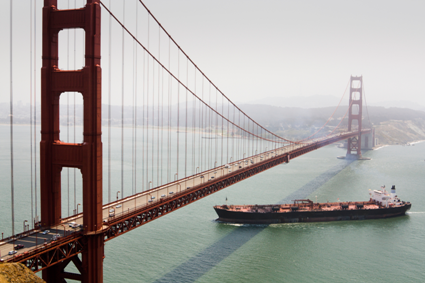- Blog
- Sustainable Economic Systems
- New report recommends best practices for expanding short sea shipping in California
New report recommends best practices for expanding short sea shipping in California

Donate Now!
Your contribution will benefit Friends of the Earth.
Stay Informed
Thanks for your interest in Friends of the Earth. You can find information about us and get in touch the following ways:
With domestic freight transportation projected to increase rapidly within the next decade, short sea shipping (i.e. moving goods using vessels rather than trucks) has been touted as an economical, environmentally friendly alternative to trucking. A new report from Friends of the Earth, titled Expanding Short Sea Shipping in California: Environmental Impacts and Recommended Best Practices, weighs in on the environmental risks this mode of transportation presents and potential ways to mitigate its impacts.
For purposes of this report, short sea shipping refers to the regional transport of goods by ships, and focuses on two types of vessels — tugboats with barges (tug-and-barge), and larger ships that operate along the coast. This method of transport, used heavily in Europe, could help reduce congestion on roads; however it presents new threats to marine ecosystems.
Environmental Risks
To address short sea shipping’s environmental impacts adequately, three key areas need to be assessed: air emissions, ocean noise pollution, and marine mammal ship strikes.
| Black carbon emitted by ships like this Russian cruise ship in Norway will increase with short sea shipping. Photo credit: Thomas Hallermann/Marine Photobank. |
Ships use one of the dirtiest fuels on the planet — bunker fuel — and an uptick in short sea shipping may lead to localized air pollution impacts. An increase in short sea shipping will also amplify underwater noise pollution, disturbing marine mammal communications. Finally, expanded short sea shipping could increase the risk of vessel collisions with whales and other marine life.
Recommendations
The best environmental technology and practices should be used in short sea shipping, including advanced engine systems, ultra clean fuel, shore power, and regular equipment maintenance check-ups.
Friends of the Earth urges decision makers to adopt these safeguards in order to protect public health and the aquatic environment. Additionally, it is recommended that the Maritime Administration complete comprehensive reviews of the impacts on public health and the environment from short sea shipping, as well as ensure transparency in its decision-making process.
